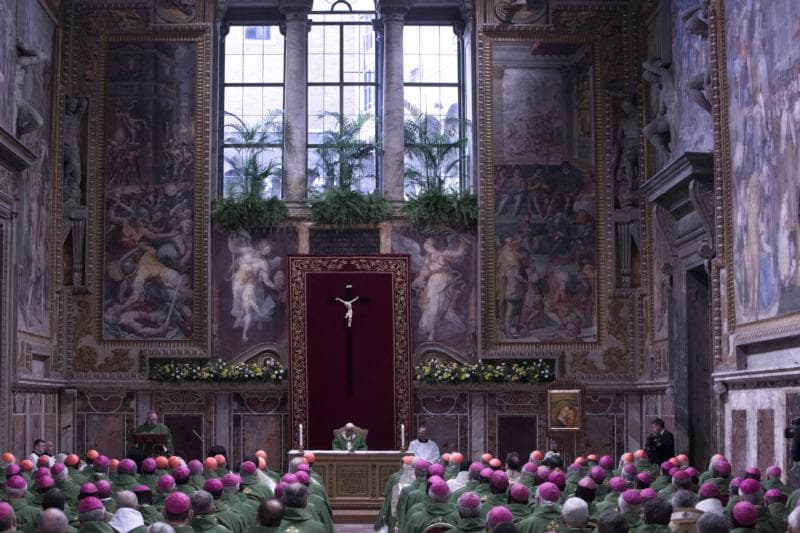ROME — After the heads of the world’s bishops’ conferences and Eastern Churches listened to four days of talks on the effects of sex abuse, it can now be said that no Church leader can claim that the issue isn’t a problem in their neck of the woods.
This is probably the most significant achievement of the unprecedented Feb. 21-24 Vatican summit on the topic which has been plaguing the Catholic Church for decades.
Yet there is a sense that for this giant step forward, there has also been a significant step backward: “Zero tolerance” – a buzzword since the scandal exploded in Boston in 2002 – no longer means priests who abuse minors will be defrocked even after one incident of abuse.
This policy was stated in its most succinct form by St. John Paul II, when he called every U.S. cardinal to the Vatican in April 2002 in the fallout of the revelations of abuse and cover-up exposed in the Boston Globe that year: “People need to know that there is no place in the priesthood and religious life for those who would harm the young.”
This is in contrast to removal from active ministry, when a priest does not have a pastoral assignment – and often is told not to even present himself as a priest in public – but is still, technically, a cleric.
In the countries hardest hit by the sexual abuse crisis in the late 20th century – including the United States and Ireland – the families of victims were told an abusing priest was going to be removed from ministry, only later to find out he was serving as a priest in another location.
This is why most victims support groups – including the Ending Clergy Abuse advocacy group, which had a large contingent in Rome – have insisted abusive priests should be removed from the priesthood.
From the beginning of the meeting, the Vatican showed it was resisting this policy.
Pope Francis issued a list of 21 “points of reflection” – which he said had come from the bishops’ conferences but had been “organized” by the pontiff.
RELATED: Will Vatican snatch defeat from jaws of victory at anti-abuse summit?
Point 15 called on the Church to “observe the traditional principle of proportionality of punishment with respect to the crime committed,” and added “that priests and bishops guilty of sexual abuse of minors leave the public ministry.”
It didn’t mention defrocking.
The next day, Cardinal Sean Patrick O’Malley of Boston, the president of the Vatican’s commission charged with formulating safeguarding polices, returned to that John Paul quote from 2002, but with an important difference.
“The principle that was so clearly articulated by John Paul II – that there’s no place in ministry for someone who harms a child – that has to be a line in the sand,” the cardinal said at a press conference.
He was not the only prelate to stay on message on this point.
Irish Primate Eamon Martin told reporters the “default position” of the Church should be that abusive priests “will not minister in any capacity.”
There are two main reasons for this backpedalling on a strong zero tolerance policy.
The first is hinted at in the “point of reflection,” which mentioned the “proportionality of punishment.”
Since removal from the clerical state is the closest thing to a “death penalty” in the Catholic Church, some Church officials argue that imposing the sentence on all cases of abuse effectively puts them on the same level. A priest who has a single sexual encounter with a person days before their 18th birthday is treated with the same harshness as a serial child rapist.
The other factor is oversight, which was mentioned by Martin in his comments to reporters: Removing priests from the clerical state would pose “increased risk,” since they would no longer be monitored by the Church.
It is hard to see either reasons being readily accepted by survivors’ advocacy groups, or even many of the lay faithful.
RELATED: Survivors blast pope’s ‘reflection points’ on abuse as less than zero tolerance
The Church’s record on oversight of abusive priests removed from ministry is a mixed bag at best, and decades of cover-ups and other scandals mean Church leaders have little credibility in this area.
As for the issues of “proportionality,” it is hard to convince most of the laity that defrocking is a proportionally grave punishment for the sexual abuse of minors – it also makes it seem that becoming a layperson is literally the worst thing that could ever happen to a cleric.
All of this creates a danger that the Vatican is more concerned about protecting the rights of abusive priests than protecting those who have been abused.
The Vatican abuse summit has done a lot of good in convincing Church leaders that sexual abuse is a global problem, and it would be a horrible irony if the first real outcome was throwing zero tolerance out the window.













